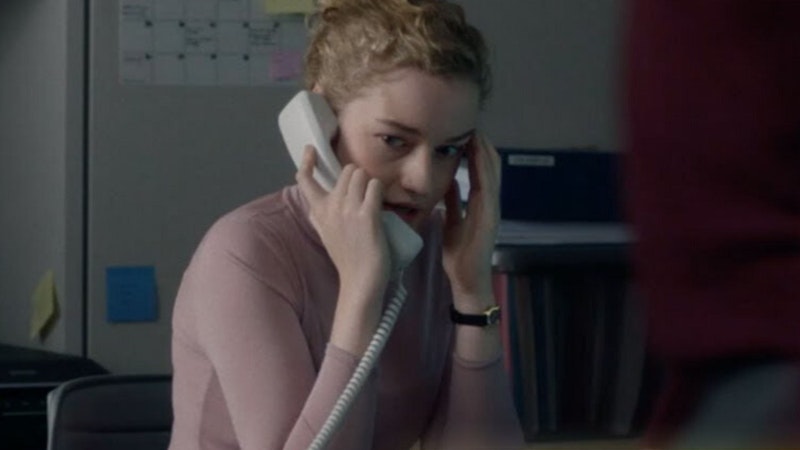The Assistant is a hard-to-watch but well-rendered tale that's meant to evoke the Harvey Weinstein scandal, but is also about the overall indignities of the American workplace. Debuting at Sundance last month and now rolling out in theaters, The Assistant has a difficult tone to capture, but gets it right.
Written and directed by Kitty Green, who's best known for the documentary Casting Jon Benet, The Assistant focuses on Jane (Julia Garner), a young woman who works as an assistant at a Miramax-like New York-based film company, for a Weinstein-like boss.
A graduate of Northwestern, she has ambitions to produce movies but is stuck making copies and arranging travel for a studio mogul. This puts her in proximity, and possible complicity, with some ugly situations. The Harvey character is never seen and only rarely heard. But the film almost perfectly captures the atmosphere of the sort of office where everybody's miserable and living under the thumb of a rage-prone boss who's only ever referred to as "him." It's a situation that's demoralizing even if the boss isn't famous, and even if there isn't sexual misconduct going on.
Another thing the film gets right? Not only is your company's human resources chief not your friend, but that person will knife you in a second, even if he's not played by Tom from Succession (Matthew Macfayden.) Julia Garner, best known from the Netflix show Ozark and also the later seasons of The Americans, does wonderfully understated work as the title character.
"When will Hollywood make a movie about Harvey Weinstein?" has been a right-wing refrain for a couple of years now, especially after last year's uneven Roger Ailes dramatization, Bombshell. With The Assistant, it sort of has, although more such films are on the way; a big-screen adaptation of Ronan Farrow's hyper-cinematic book Catch and Kill seems inevitable.
The Assistant is probably the best film of its kind in the #MeToo era to date. It's not preachy, and doesn't congratulate itself for making a political stand. It merely commits to telling a story. A
•••
The Misogynists
Set in a different part of New York City than The Assistant, and possibly at around the same time, director Oner Turkel's The Misogynists is a film that we're going to start to see a lot of in the coming years. It’s a political comedy that seeks to explore the mood of the Trump years, while also taking satirical shots at all sides of the ideological spectrum.
Ike Barinholtz's The Oath, in 2018, attempted something similar, with middling success, and Jon Stewart's upcoming Irresistible looks like it’s going for the same sort of thing—with ghastly results, if the trailer is any indication. The Misogynists doesn't land all of its punches, but it has its moments.
The film’s set entirely on election night in 2016, right after Trump was declared the winner. Two men are celebrating in a hotel room—Cameron (Dylan Baker), a boorish, sexist and racist Trump supporter, and Baxter (Lou Jay Taylor), who's more lukewarm in his support. We soon learn that Cameron has been living in the hotel for months since his wife kicked him out, while Baxter has a Trump-hating wife at home who periodically calls and yells at him.
Various people, including a black woman next door who objects to their noise; a Mexican room service guy; and eventually a pair of sex workers, visit the characters. The film consists of many conversations that you've likely heard in real life.
Baker's character is a caricature of a Trump backer, the guy who sees Trump's victory as a pure validation of his own most unattractive personal qualities. Cameron isn't the most loathsome character Dylan Baker has ever played—his child-molesting dad in Todd Solondz's Happiness still takes that title—but it's in the ballpark.
As for Baxter, the film establishes that while there’s not a straight line from his politics to his own personal problems, when it comes to issues with women, he’s his friend’s equal. It's a very talky film: some of the discussions are more insightful than others.
The Misogynists was presumably completed quickly and relatively cheaply in the aftermath of the 2016 election and spent an uncommonly long time on the festival circuit, debuting in 2017 up until its brief release this month. It’s likely appeal to anyone who doesn't feel they're hearing enough bitter arguments about Donald Trump in their own life. B-

